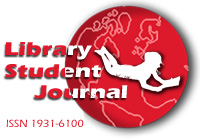Just over a week ago, I returned from attending the Joint Conference of Librarians of Color (JCLC). JCLC is sponsored by the five ALA ethnic associations: AILA, APALA, BCALA, CALA, and REFORMA. This year was only the second time the conference was held — the first happened six years ago. I first heard of JCLC a couple years ago and was very excited to learn that the second conference was in the process of being planned. I’m very fortunate and grateful to have received a Kansas City Crown Center Scholarship that funded my trip. Without that financial assistance, there’s no way I would have been able to attend.
JCLC was definitely the best conference I have attended (so far). The size of the conference wasn’t large enough to be overwhelming, or too small to be stifling, and everyone I met was incredibly friendly and approachable. The main reason I wanted to attend is that the conference’s focus is on exploring various diversity issues in libraries, and my research interests all center on issues of diversity in archives.
While I attended many sessions over the course of a few days, I enjoyed “The Need for Diversity Research in the Profession: A Collaborative Opportunity” the most. Karen Downing, Merve Fejzula, and Mark Winston all made a strong case for why more research needs to be conducted on diversity in the profession. Below is a storify of tweets from that session, but missing from them is another takeaway I got — often research is conducted that is then not shared. Research isn’t only to inform our own work but to inform others as well, so if you’ve done something, be sure to share that knowledge with others!
I want to expand on that last tweet because it’s a pet peeve of mine. Research needs to be grounded in and contextualized by the existing literature. If you haven’t taken a look at what others have already done, your work just won’t be as strong. This is something I definitely look for when conducting peer reviews of papers submitted to the SLIS Student Research Journal, and I find that often it is either missing or people just summarize works in their literature reviews without providing any analysis of them. The latter is something I did until I finally had a professor who provided actual guidance on writing scholarly literature reviews, instead of assuming everyone was already skilled in writing them. I definitely think that a research methods course should be a requirement in all library schools, but unfortunately that’s not the case. How are we supposed to educate others about conducting research if we don’t have any experience ourselves?




 A few months ago at Hack Library School, I wrote a
A few months ago at Hack Library School, I wrote a 






comments